|
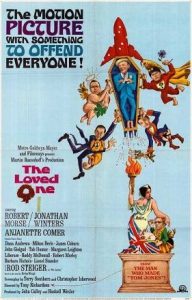
Synopsis:
A penniless British poet (Robert Morse) arrives in Los Angeles to visit his uncle (John Gielgud), who works as an artist for a movie studio run by a young producer (Roddy McDowell) and his junior executive (Jonathan Winters). When Gielgud dies unexpectedly, his British compatriot (Robert Morley) arranges to have him buried at Whispering Glades, a mega-funeral home run by Winters’ brother (also played by Winters), where Morse romances a young beautician (Anjanette Comer) being pursued by a middle-aged mortician named Mr. Joyboy (Rod Steiger).
|
|
Genres, Themes, Actors, and Directors:
- Black Comedy
- Dana Andrews Films
- Death and Dying
- James Coburn Films
- John Gielgud Films
- Love Triangle
- Robert Morley Films
- Rod Steiger Films
- Roddy McDowell Films
- Tab Hunter Films
- Tony Richardson Films
Response to Peary’s Review:
Tony Richardson’s adaptation of Evelyn Waugh’s 1948 novel — co-scripted by Christopher Isherwood and Terry Southern — is beautifully shot by DP Haskell Wexler, headily surreal (“Let me explain the dream to you — this entire place is a dream.”), and has “a scene to offend everyone”, but (as Peary notes) features “plodding” direction and fails to pack a satisfying overall punch. Part of the problem lies in failure to connect with Morse, who lacks charisma and doesn’t inspire much investment. There are also far too many cameos and sub-plots, including several not present in Waugh’s original novel (i.e., the final outrageous twist about Winters’ nefarious plans for the corpses in his care). Scenes of excess and grotesque greed — such as “Comer’s visit with embalmer Joyboy’s (Rod Steiger) grossly fat mother [Ayllene Gibbons], who’s pigging out on food and salivating over food commercials on television; a woman (Margaret Leighton) battling her husband (Milton Berle) over giving up their beloved dead dog; and a gravelly-voiced huckster (Lionel Stander) pretending to be a sage guru-by-mail — seem merely calculated for shock. By the time Dana Andrews shows up in a small role as a general, the story has twisted too many times to maintain interest. Ultimately, the excesses of both Hollywood and funeral preparations in California have been more effectively portrayed in other cinematic efforts — see, for example, John Schlesinger’s The Day of the Locust (1975) and Errol Morris’s Gates of Heaven (1978).
P.S. As Peary notes, “one of the best scenes has Morse visiting Comer’s unsteady house-on-stilts, which is built in a slide area” (see still below).
Redeeming Qualities and Moments:
- Haskell Wexler’s cinematography
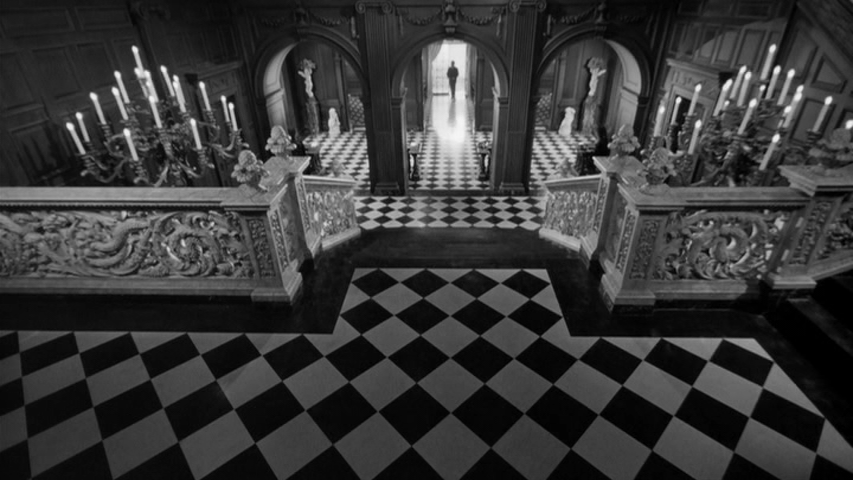
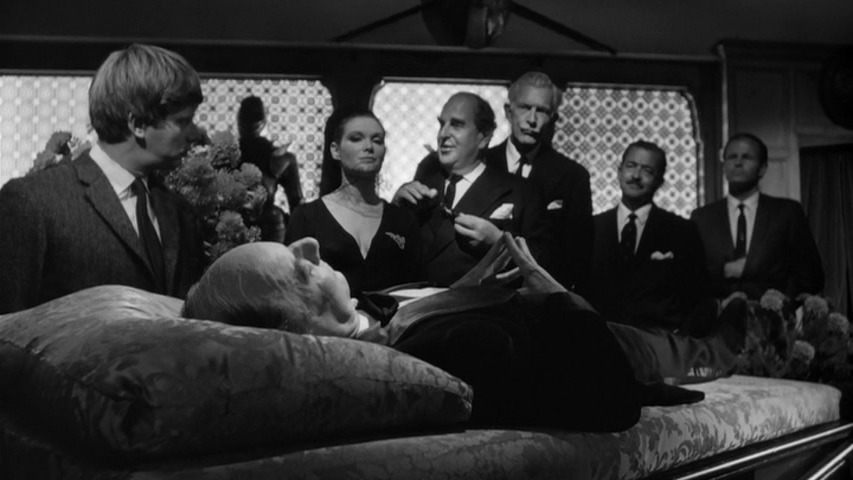
- Some effectively satirical scenarios and sets

- Rod Steiger as Mr. Joyboy
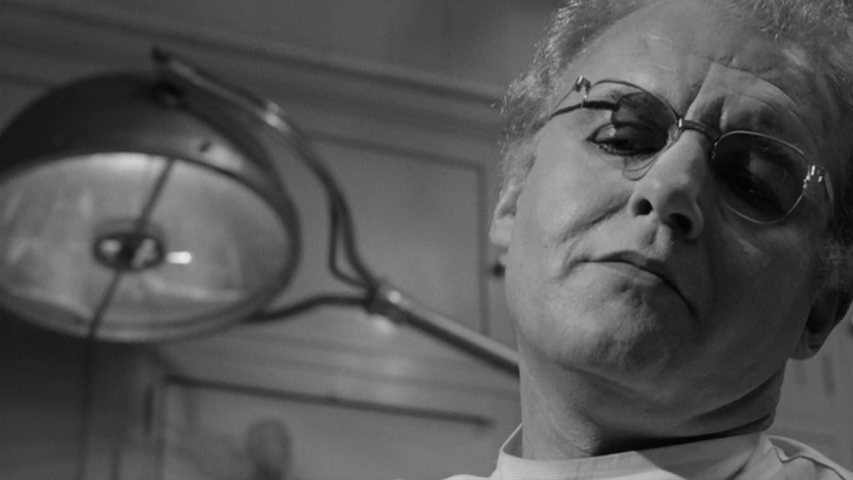
- Liberace’s too-short cameo role: “Rayon chafes, you know. Personally, I find it quite abrasive.”
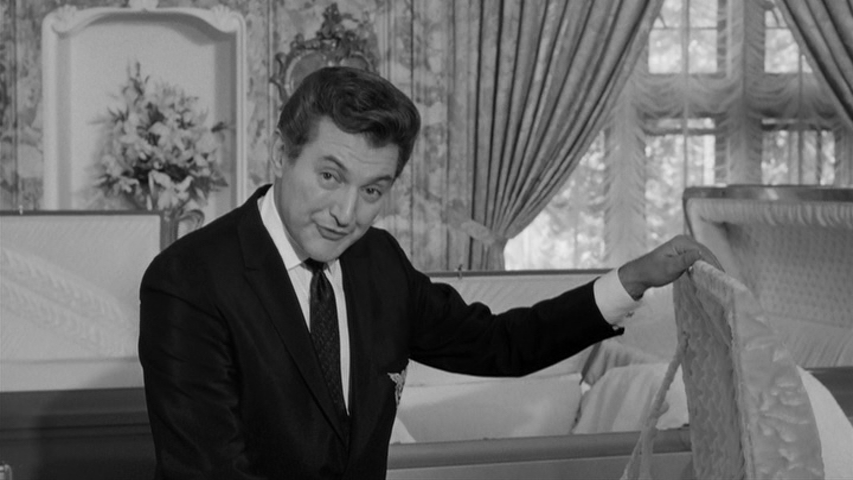
Must See?
No, though it’s certainly worth a one-time look.
Links:
|






One thought on “Loved One, The (1965)”
Not must-see. ~which is a shame. But it’s because ‘TLO’ falls into a very rare position for a film: the first half is absolutely marvelous; the second half falls completely apart.
I haven’t read the book (I don’t think I’ve read any of Waugh’s work) – and Wikipedia tells us that the film essentially maintains only the basic premise of the source material. If we only sense a little of Christopher Isherwood’s co-writing contribution, we can certainly hear a lot of what Terry Southern wrote. And a lot of that is very, very funny – on this re-watch, I genuinely laughed out loud a number of times. …In the first half.
And then…something unusual begins to happen in the film. A certain malaise seems to descend on the project and things begin to dissipate – even as the writers seem to be desperately clinging to the spirit (and logic) of their original intent. Up until midway, Richardson (who can be less than disciplined in his approach) does a fine job with exploiting very sharp black comedy.
But then things turn grey – even Richardson can’t overcome what goes from sharp to vague or slapdash.
The one thing that remains a constant is DP Wexler. His commitment to his established mood helps some in keeping the second half going. (His thoroughness is brought out wonderfully in the blu-ray, which is what I saw for this re-watch.)
With the possible exception of Morse (who seems kind of miscast), Richardson assembled a rather terrific troupe of comedians. But, again, after the first hour, you can almost sense them losing confidence in what they’re being asked to play. For the most part (with, I think, the exception of Gielgud and Anjanette Comer – and I happen to like her a lot in this), the actors are all playing rather unsavory people. That’s not particularly a drawback. They’re still rather compelling to watch (and, in some cases – i.e., Liberace and Steiger – genuinely hilarious) – until the film stops caring about basics like structure, consistency, development and jokes (and the humor turns noticeably mean-spirited).